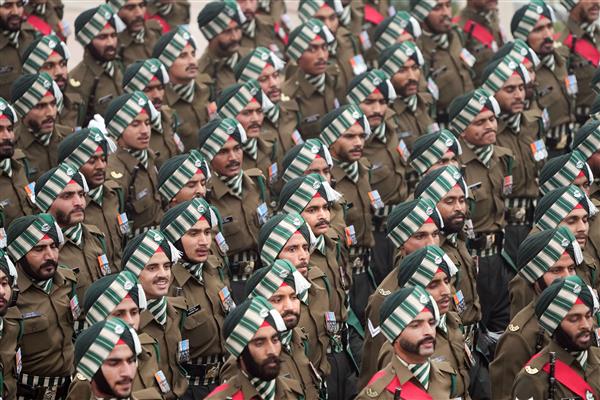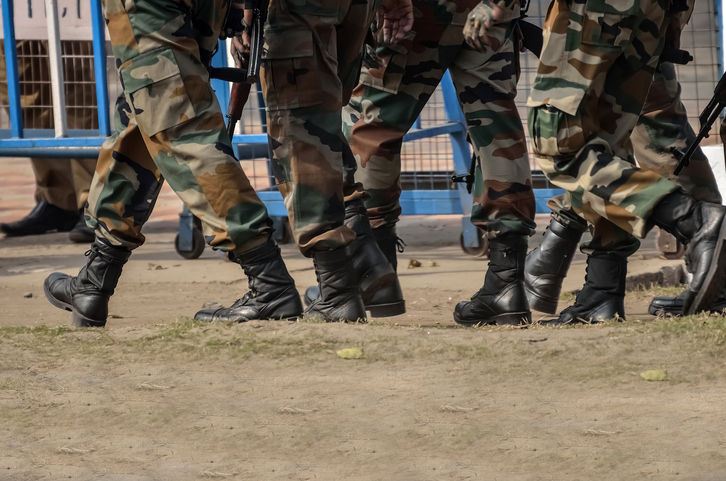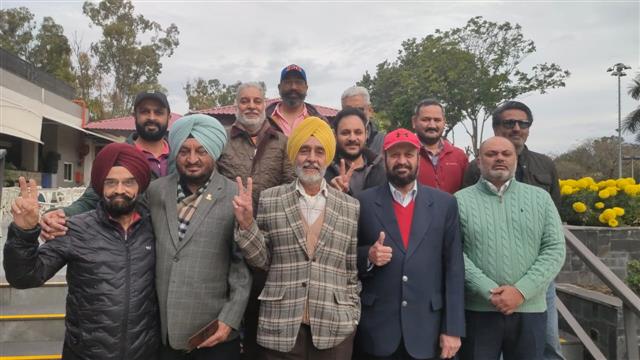












Marching contingent of Punjab Regiment during the 74th Republic Day Parade at the Kartavya Path, in New Delhi on January 26, 2023. – PTI file photo
Tribune News Service
New Delhi, January 30
The Punjab regiment has been adjudged the best marching contingent among the three services at the Republic Day parade, while the Central Reserve Police Force (CRPF) was declared the best among Central Armed Police Forces (CAPF) and other auxiliary forces.
The Ministry of Defence today announced the awards of the best marching contingents and tableaux of Republic Day Parade.
Three panels of judges were appointed for assessing the performance of marching contingents. Among the tableaux of the states, Uttarakhand bagged the top honours followed by Maharashtra and Uttar Pradesh.
As for the cultural troupes, the Vande Bharatam dance group emerged the winner
Meanwhile, an online poll was conducted on the MyGov platform for citizens to vote for their favourite tableaux and marching contingents.
The Indian Air Force was the adjudged the best marching contingent among the three services, while the Central Reserve Police Force (CRPF) won in the category of CAPFs.
Among the states, the Gujarat tableau was adjudged the best in the online poll followed by Uttar Pradesh and Maharashtra
U’khand tableau adjudged the best

Vijay Mohan
Chandigarh, January 30
The Armed Forces Tribunal (AFT) has directed the Army to consider a colonel for promotion to the rank of Brigadier afresh after observing lapses in the prescribed rules and procedures over five years after he was first considered for elevation.
A serving colonel had approached the Tribunal over his non-empanelment by the selection board over the manner in which his confidential reports (CR) for a particular period were processed and inadequate redressal of his complaints thereof.
In 2013, a court of inquiry (COI) was ordered to investigate into certain lapses by the officer and he was awarded a censure. A second COI against the applicant was held in 2015 and he was again given a censure in 2016.
The officer was considered for promotion to the rank of Brigadier in 2017 and was not empanelled. Aggrieved, he filed a non-statutory complaint in 2018 on which he was granted partial redressal where one grading in the CR by the initiating officer and reviewing officer in two different CRs were expunged and four other CRs were also expunged, having been found technically invalid
The officer was also directed to be considered for promotion as a special review fresh case, but was not empanelled after being considered twice.
In his petition before the AFT, the officer contended that he cannot be made a victim of a situation where out of a total of six CRs pertaining to the period of disciplinary action, four were set aside mere on grounds that the senior reviewing officer’s (SRO) permission was not taken when under similar condition subsequent CRs were permitted merely because of a change in policy.
The Tribunal observed that records indicated that no sanction was taken from the Military Secretary’s (MS) Branch as required in the absence of a SRO and the internal assessment had missed the fact that the applicant was under a disciplinary process and that permission was required.
“We are of the opinion that if this was indeed such an important infringement, it ought to have been identified during internal assessment and necessary action taken,” the Tribunal’s Bench comprising Justice Rajendra Menon and Lt Gen PM Hariz held.
The Bench further said whether it was possible for the MS Branch to have granted an ex post facto sanction to cover the lapse, on the premise that there was nothing that would have denied a sanction in the first place, has also not been explored, examined and documented.
“We are of the opinion that obtaining sanction in the first place was an organisational responsibility of the unit to which the petitioner was posted and cannot be seen to be the responsibility of the petitioner himself. Moreover, we also hold that having ‘missed’ the issue and having identified these CRs as being technically valid only in August 2018, considering the special circumstances of this case, this lapse should have been regularised by the MS Branch when it came to its notice for the first time,” the Bench said
Stating that that serious prejudice had been caused to the petitioner with these four CRs being set aside as technically invalid, the Bench ordered that these four CRs be restored and the officer be considered for promotion in the earlier selection boards where the four CRs were not included in the reckonable profile. The Bench did not interfere in the proceedings of two other boards in which the officer was not empanelled.

Tribune Web Desk
Chandigarh, January 30
Lt Col HS Chahal (retd), popular known as Bobby Chahal, has been re-elected president of the Chandigarh Golf Club as he beat his rival Maj Rajinder Singh Virk (retd) by 29 votes. Chahal secured 591 votes while Virk got 562 votes and 3 votes were declared invalid.
On Sunday, around 64 per cent turnout was witnessed in the Chandigarh Golf Club (CGC) elections. Of the total 1,800 voters, 1,150 members cast their vote to choose the new president, along with 11-member executive body, of the club.
THE statement by the Commander-in-Chief in the Legislative Assembly on January 24 on Indianisation of the commissioned ranks of the Indian army was on the same footing as the two announcements made on behalf of His Majesty’s Government during the same week. All three are parts of the same scheme, a scheme of which the underlying idea is to defer the day of Indian self-government to a distant future, and are calculated to produce the same impression on the public mind of India. The question of Indian self-government resolves itself on analysis into three issues: the transformation of the Indian Legislature into a real Parliament representative of and responsible to the people and having complete mastery over the Government; the Indianisation of the superior executive agency by which the work of the civil administration is carried on; and the Indianisation of the forces of defence. In respect of the first two of these all-important matters, the Secretary of State has told the Indian public that its aspirations are premature and that whatever a future British Government or British Parliament may do, he is not prepared to take any step at present. The Commander-in-Chief says the same thing in effect as regards the last. What lends significance to the action of His Excellency is the fact that the proposal before the House, in connection with which he made his statement, was by no means radical. It said nothing about the Indianisation of the forces of defence as a whole or even of the entire army. “Indianisation”, he said, “is in no way connected with the British units serving in India or with the question of reducing their number. The question arises in regard to a portion of the army, and the object in view is the replacement of British officers by Indian officers holding King’s commissions.”
Aditi Tandon
New Delhi, January 30
Defence Minister Rajnath Singh on Monday said there was no cause of concern on the LAC issue and the Indian soldiers had done a fantastic job repelling the unilateral attempts of China along the LAC.
Singh was responding to a demand by the BSP at an all-party meeting to discuss the Galwan issue in Parliament.Powered By
When the BSP said there were certain places where the Chinese had come in, Rajnath Singh, in a rare intervention, said “I have to intervene here to say nothing untoward or wrong has happened. Certain information cannot be spoken on the floor of the House, but I wish to assure that our soldiers did a fantastic job along the LAC and there was no cause for concern.”
New Delhi, January 30
The “dysfunctional” system of the UN Security Council has been reflected in the “absurd” situation arising out of one of its permanent members attacking Ukraine and the global body’s failure to address it, UN General Assembly President Csaba Korosi said on Monday.
In an address at a think-tank, Korosi called for urgent reform of the UNSC to reflect the changing balance of global power and economic heft of various countries and criticised the slow process that was started around 17 years back to bring the changes.
India has been strongly demanding permanent membership in the UNSC considering the size of its population and role in international affairs. The current permanent members of the UNSC are China, France, Russia, the UK and the US.
Addressing a group of diplomats, strategic affairs experts and academicians at the Indian Council of World Affairs (ICWA), the UNGA president also wondered why there is still no agreement on a text to take forward the reform process.
“Does it have a time frame? No, I think it does not. Does it have a negotiated text, no it does not…Have you ever seen a negotiated process that has no text to negotiate? Have you ever seen a negotiating process that has no clear-cut timeframe for when to deliver,” he asked.
“Why the member states cannot do it? Because the interests are very much divided, and for some, it is more preferable to see the current dysfunctional stage than to embark on a reform,” he said.
The Hungarian diplomat, who is currently serving as the President of the 77th United Nations General Assembly, commended India’s call during its recent membership of the UN Security Council, for peace in Ukraine and its humanitarian aid for people hit by the conflict.
Korosi said the war in Ukraine has caused untold suffering, displacements and “unleashed” an energy and food crisis across the globe.
The president of the UN General Assembly, on a three-day visit to India also lauded New Delhi for sending medical aid and Covid-19 vaccines to a large number of countries to help them deal with the pandemic.
Korosi also complimented India for the safe evacuation of its citizens from Ukraine after Russia started its invasion of that country in February last year.
On the reform of the UN Security Council, the UNGA President urged the member states to make compromises and consider even making partial agreements under a step-by-step approach to reform of the UNSC. “Otherwise it will be very very difficult.” Korosi identified the Ukraine war and lack of agreement on a text for taking forward the reform process.
“There are two major problems that we are facing. One was brought up by the war in Ukraine. The Security Council was created in 1945 to be the prime responsible organ for catering to international peace and security, to make sure that there would be no more wars,” he said.
The aim of the UNSC was to avert war and large-scale destruction, and, therefore, extraordinary powers have been placed into the hands of the Council, he said.
“What if the Security Council members, one of them, a permanent member that has those extraordinary powers including the Veto power, is the one attacking its neighbour? It created a situation where the Security Council is incapable of addressing this issue,” Korosi said.
“Since the very beginning of the war in Ukraine, the Security Council has not been able to take any decision on the war on Ukraine. So it is an absurd situation which is describing the dysfunction of the Council,” he said.
The UNGA president millions of people who were expecting the UN to deliver were frustrated by the UNSC’s approach towards the Ukraine crisis.
“If millions of people were expecting the Security Council to make sure that wars would not be repeated, they would be frustrated. I can understand that,” he said.
Korosi said the composition and the working method of the UNSC were based on the situation in 1945-46 following the Second World War.
“Since then, much has changed. The world economy has changed, the balance of power in the world has changed…so it is absolutely understandable that the countries and the leaders of the world are more and more impatiently demanding that the Security Council should be reformed,” he said.

























































